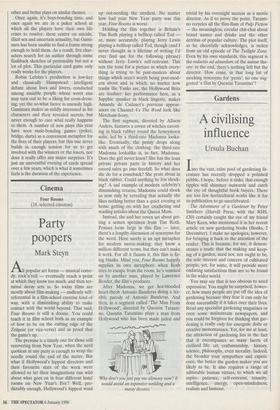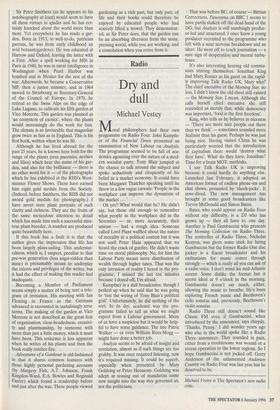Gardens
A civilising influence
Ursula Buchan
Into the vast, calm pool of gardening lit- erature has recently dropped a polished pebble. I hope, before it sinks, that enough ripples will shimmer outwards and catch the eye of thoughtful book buyers. There are too few horticultural works like it for its publication to go uncelebrated.
The Adventures of a Gardener by Peter Smithers (Harvill Press, with the RHS, £30) certainly caught the eye of my friend Mary Keen, who mentioned it in her recent article on new gardening books (Books, 2 December). I make no apologies, however, for bringing it back to the attention of the reader. This is because, for me, it demon- strates a truth: that the making and keep- ing of a garden, need not, nor ought to be, the sole interest and concern of cultivated people, yet, for some, it will provide more enduring satisfactions than are to be found in the wider world.
You may say that is too obvious to need expression. You might be surprised, howev- er, how many people are put off the idea of gardening because they fear it can only be done successfully if it takes over their lives. Read any specialist gardening magazines or even some mainstream newspapers, and you could be forgiven for thinking that gar- dening is really only for energetic dolts or creative monomaniacs. Yet, for me at least, the attraction of gardening lies in the fact that it encompasses so many facets of civilised life: art, craftsmanship, history, science, philosophy, even morality. Indeed, the broader your sympathies and experi- ence, the better the garden maker you are likely to be. It also requires a range of admirable human virtues, to which we all aspire: patience, self-restraint, tenacity, intelligence, energy, open-mindedness, realism and humour. Sir Peter Smithers (as he appears in his autobiography at least) would seem to have all these virtues in spades and he has cer- tainly knocked about the world more than most. Yet everywhere he has made a gar- den. Born in 1913, to well-to-do, patrician parents, he was from early childhood an avid botanist/gardener. He was educated at Harrow and Oxford, leaving the latter with a First. After a spell working for MI6 in Paris in 1940, he was in naval intelligence in Washington when Pearl Harbor was bombed and in Mexico for the rest of the war. Afterwards, he became a Conservative MP, then a junior minister, and in 1964 moved to Strasbourg as Secretary-General of the Council of Europe. In 1970, he retired to the Swiss Alps on the edge of Lake Lugano, to cultivate his fifth garden at Vico Morcote. This garden was planned as `an ecosystem of exotics', where the plants would increasingly do the work for him. The climate is so favourable that magnolias grow twice as fast as in England. This is his first book, written when he was 80.
Although he has lived abroad for the past 25 years, he is known here both for the range of the plants (tree paeonies, nerines and lilies) which bear the name of his gar- den, and also for the brilliance — there is no other word for it — of the photographs which he has exhibited at the RHS's West- minster Flower Shows. These have earned him eight gold medals from the Society. (Indeed, before Smithers, the RHS did not award gold medals for photography.) I have never seen plant portraits of such clarity and richness. They are the fruits of the same meticulous attention to detail which has made him such a successful ama- teur plant breeder. A number are produced quite beautifully here.
If this book has a fault it is that the author gives the impression that life has been largely plain-sailing. This understat- edness, which is, I suspect, peculiar to that pre-war generation (less angst-ridden than mine) is presumably meant to underplay the talents and privileges of the writer, but it had the effect of making this reader feel inadequate.
Becoming a Member of Parliament seems simply a matter of being sent a tele- gram of invitation. His meeting with Ian Fleming in France as the Germans advanced is recounted in tantalisingly terse terms. The making of the garden at Vico Morcote is not described as the great feat of organisation, clear-headedness, creativi- ty and plantmanship, by someone with more than just a little money, which it must have been. This reticence is less apparent when he writes of his plants and then the book really catches fire.
Adventures of a Gardener is old-fashioned in that it shares common features with those highly personal gardening accounts (by Margery Fish, A.T. Johnson, Frank Kingdon-Ward, E.A. Bowles and Reginald Farrer) which found a readership before and just after the war. These people viewed gardening as a rich part, but only part, of life and their books could therefore be enjoyed by educated people who had scarcely lifted a trowel. They demonstrat- ed, as Sir Peter does, that the garden can be an absorbing diversion from the noisy, pressing world, while you are working, and a consolation when you retire from it.



















































 Previous page
Previous page